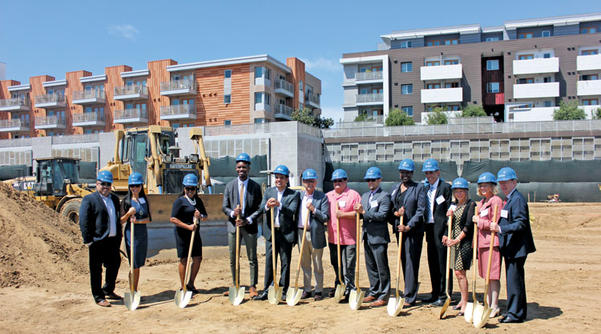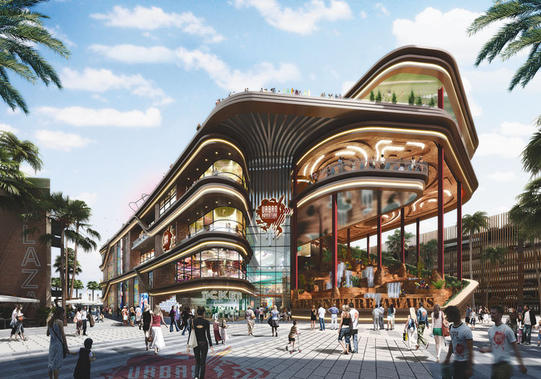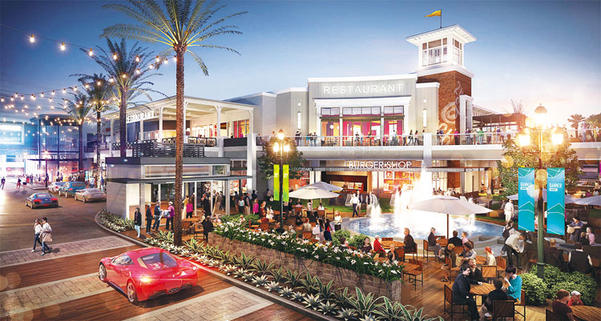Development News
The Beacon
On August 16, developer Century Housing and Long Beach city officials celebrated the groundbreaking of The Beacon, a two-building affordable housing development.
“It’s going to provide important housing for our veterans that have experienced homelessness, and it’s also going to provide housing for low-income seniors,” Mayor Robert Garcia said. “So it’s going to be a really great project. The city put a lot of investment into it, and it’s also going to transform that corner of the downtown.”

On August 16, Century Housing broke ground on The Beacon, a two-building affordable housing development to serve veterans and low-income seniors. The development is located on the southwest corner of Long Beach Boulevard and Anaheim Street. At seven-stories, Beacon Place features 121 units of low-income senior housing, while the five-story Beacon Pointe includes 39 units of low-income veterans housing. Photographed from left: Oscar Alvarado, director of housing development for Century; Lesley Milovich, executive vice president of community lending and investment for Wells Fargo Bank; Alison King, executive director of the Long Beach Housing Authority; Rajan Hoyle, district manager for the Office of Councilwoman Lena Gonzalez; Mayor Robert Garcia; Alan Lowenthal, U.S. Representative, 47th District; John Thomas, chair of the Long Beach Community Investment Company; Sergio Mondragon-Lopez, Veterans Housing and Homelessness Prevention Program manager at the California Department of Veterans Affairs; Shalawn Garcia, loan officer for California Housing and Community Development; Brian D’Andrea, senior vice president of housing for Century; Carrie Hawkins and Kristina Olsen, board of directors for Century; and Ron Griffith, president & CEO of Century. (Photograph by the Business Journal’s Brandon Richardson)
The project is being constructed on a 1.6-acre site on the southwest corner of Long Beach Boulevard and Anaheim Street. The seven-story Beacon Place will feature 121 units of low-income senior housing (half of which are allocated for homeless seniors), while the five-story Beacon Pointe will consist of 39 units for low-income veterans with special needs and veterans experiencing or at risk of homelessness.
The development also includes a community room with a full kitchen, a supportive services room, a bike storage area, a gym, outdoor public plazas and more than 6,000 square feet of retail space along the ground floor.
According to Brian D’Andrea, senior vice president of Century Housing, the high-profile intersection features the most pedestrian activity in all of Long Beach.
“It’s a highly trafficked site, and it’s kind of the entry into the downtown core. And the architecture itself needed to speak to that,” D’Andrea said. “So we needed to have that iconic corner element, which you see with the tower. We really wanted it to be exciting and announce the renaissance that’s happening in Downtown Long Beach.”
The Beacon is located directly across from the Metro Blue Line light rail and bus lines that operate along both Long Beach Boulevard and Anaheim Street. D’Andrea noted these transit services would assist residents by connecting them to vital services and workplaces.
Between both phases, The Beacon development cost is a little more than $80 million, with funding coming from several sources, according to D’Andrea. The Long Beach Community Investment Company, which was established by the city council to oversee the delivery of housing and neighborhood revitalization services as part of the Housing Services Division of the Development Services Department, provided a seed investment of $12.276 million to kick-start the project, allowing Century Housing to leverage additional funding sources.
Other funding sources include the state’s Veterans Housing and Homelessness Prevention program (funded by Proposition 41), the Federal Home Loan Bank of San Francisco’s Affordable Housing Program and a Home Depot Foundation grant. The project also qualifies for low-income housing tax credits, a federal program allocated through the State of California’s Tax Credit Allocation Committee.
D’Andrea noted that Allison King, director of the Long Beach Housing Authority, was able to provide project-based vouchers, which help pay for rent in privately owned rental housing as part of the U.S. Department of Housing and Urban Development’s Housing Choice Voucher Program.
The Beacon is slated for completion in fall 2019, according to D’Andrea, who is also housing president at Century Villages at Cabrillo, an affordable housing campus consisting of 572 affordable homes that cater to veterans, homeless students, low-income families and other groups needing housing assistance.
“This was an opportunity for us to . . . extend the work we’ve been doing out in West Long Beach for all these years into the downtown core,” D’Andrea said. “We’re really excited about helping transform this [area] and actually address some of the city’s needs in terms of some of its most vulnerable residents.”
The Current Sold As Shoreline Gateway East Tower Prepares To Break Ground
Earlier this month, West Hollywood-based Sunset Group (formerly Studio Management Services) announced its purchase of The Current in Downtown Long Beach for $132.9 million.
The Current is a $70 million development by Westchester-based Anderson Pacific, San Diego-based Ledcor Properties Inc. and Canada-based Qualico Developments Inc., which opened in July 2016. Located at 707 E. Ocean Blvd., the 17-story high-rise consists of 233 apartment units and 6,100 square feet of retail space.
Next door to The Current, the future location of the Shoreline Gateway East Tower has seen recent activity with temporary fencing being set up in what is now a surface parking lot for on-site testing, according to Ryan Altoon, vice president of Anderson Pacific. Altoon said the fencing would be coming down shortly, with a groundbreaking for the 35-story tower not expected until the first quarter of next year.
The original proposal for East Tower featured 221 units, 393 parking stalls and 6,367 square feet of retail space on the ground floor. However, earlier this year, the development group updated the plans to include 315 units, 458 parking stalls and 6,711 square feet of retail space.
A 10,000-square-foot plaza will conjoin The Current and East Tower, which will be the tallest building in the city at 417 feet.
Queen Mary Island Urban Adventures

The Urban Adventures entertainment concept is scheduled to be part of Queen Mary Island. (Rendering provided by Urban Commons)
In an August 11 Facebook post, the Queen Mary and Urban Commons unveiled new renderings of Urban Adventures, an entertainment concept developed by London-based Urban Legacies. According to the post, the bulk of the designs for the center have been completed, despite groundbreaking being several years out. The Urban Adventures development includes a 150,000-square-foot facility boasting “22 different sports and entertainment activities in a single building, including two rooftop surf pavilions, a zip line roller coaster, ice climbing, ropes courses and a Ninja Warrior training ground.” Urban Legacies has been developing the entertainment concept for the past five years, with plans to open facilities in “key international markets across Europe, Southeast Asia and North America,” according to the company website. Included in the Urban Commons announcement were plans for a 7,000-seat amphitheater overlooking the water, 500,000 square feet of entertainment and retail space, a boardwalk, and public music performances and art installations.
2nd & PCH Up For Approval

The final environmental impact report and site plan review for 2nd & PCH are up for approval at the September 7 Long Beach Planning Commission meeting. The proposed development is located at the site of the SeaPort Marina Hotel and includes 95,000 square feet of retail space and 70,000 square feet of restaurant space. According to Steve Shaul, senior director of development for CenterCal Properties LLC, if the commission approves the project and no appeals are filed, demolition of the SeaPort Marina Hotel would likely begin in September. (Rendering courtesy of CenterCal)
The long-awaited development of the property on the southwest corner of 2nd Street and Pacific Coast Highway (PCH) could be moving forward as of September 7, when the final environmental impact report and final site plan review go before the Long Beach Planning Commission, according to Steve Shaul, senior director of development for CenterCal Properties LLC. Dubbed 2nd & PCH, the project will replace the SeaPort Marina Hotel, which has stood on that corner since opening in 1963. Raymond Lin and his family from Taiwan purchased the property more than 20 years ago with the intention of demolishing the hotel and redeveloping the site. After millions of dollars, rejected proposals and the Great Recession, Lin may finally realize that dream. The development includes 95,000 square feet of retail space, 70,000 square feet of restaurant space, a 25,000-square-foot fitness and health club and a 55,000-square-foot Whole Foods, which is relocating from its current location at the Marina Shores Shopping Center. The project is now a joint venture between Lin and El Segundo-based CenterCal, which has developed similar upscale retail centers throughout California, Oregon, Washington, Utah and Idaho. The proposal includes 1,150 parking spaces, most of which will be located on top of the project. If approved by the planning commission and no appeals are filed against the development, Shaul said demolition of the SeaPort Marina Hotel would likely begin in September. If an appeal is filed, the issue would go before the city council for final approval.
320 Alamitos Approved Despite Community Concerns
At its August 17 meeting, the Long Beach Planning Commission approved a seven-story apartment complex at 320 Alamitos Ave. The approval of the project brought out the usual concerns of downtown and surrounding area residents regarding parking, as the site is currently a surface parking lot. The 77-unit project includes a 105-stall parking garage, while the Downtown Plan – adopted in 2012 – only requires 96 spaces for a project of this size. However, residents and parking advocacy groups claim continued development on surface parking lots will worsen the parking-impacted area.
Red Car Greenway Underway
Construction is underway on the Red Car Greenway project, a park project that spans diagonally from 4th Street and Park Avenue across from the Colorado Lagoon to Ximeno Avenue and 6th Street. The land was once the right of way for the Pacific Electric Red Car trolleys from the early to mid-1900s. The $1.05 million, 3.66-acre project includes pathway lighting, concrete trails, seating, fencing, garbage bins and new vegetation. At Ximeno Avenue and 6th Street, the park intersects with a bike path, further expanding and connecting the city’s bike infrastructure.
Real Estate News
Stepp Commercial Completes Multimillion-Dollar Apartment Sale
Principal Robert Stepp of Stepp Commercial represented the seller, an Orange County-based private investor, and the buyer, a private investor from Los Angeles, in the $4.9 million sale of East Fifth Street Apartments in Long Beach. “By adding value to the units that have not already been updated, the buyer stands to secure a 25% rental upside,” Stepp said. “Long Beach is a prime market to add value to apartment properties as it has no rent control, unlike too many other Los Angeles area cities.” The 20-unit property is located at 3025 E. 5th St. near the Retro Row and Belmont Heights communities and consists of 10 two-bedroom units and 10 one-bedroom units. The sale breaks down to $245,000 per unit in the two-story building, which was built in 1961.
The Hangout Is Now Open
Located at 2120 E. 4th St. on Retro Row, The Hangout celebrated its grand opening on August 25. Owned by Melissa Carpenter, who also owns Family Store in Belmont Heights, the store carries vintage items, as well as two permanent shop-in-shops: Take It or Leave It, which specializes in high-end, curated rock tees and leather goods, and California Drifter, which offers eclectic lifestyle goods that portray the state’s easy-living vibe. The store will also feature rotating pop-up vendors and an ice cream bar stocked with Jeni’s Ice Cream for takeout. The desert-inspired patio garden is a place for customers to relax and also continue shopping, as its contents are for sale. “I’m thrilled to expand my creative vision to a setting that invites customers to relax and linger,” Carpenter said in a press release. “The question I get asked the most at Family Store is, ‘When will you do something like this for adults?’ The Hangout is exactly that – a grown-up retail environment that embraces artisan sensibilities and celebrates the maker. It’s opening up new possibilities with the brands and unique products that I bring in, and I’m excited for the store to be a place of discovery for locals and visitors alike.”
